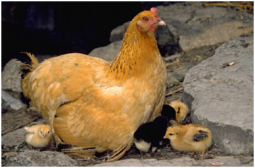
April 16, 2012 (El Cajon) – “The time has come. After 100 years of chickens being illegal in El Cajon, it’s time to bring back some private property rights,” Councilman Gary Kendrick told ECM in an exclusive interview today. On April 24 at 3 p.m., Kendrick will introduce a measure asking staff to develop an ordinance that would legalize owning hens (but not roosters) within city limits.
“I’d like to see all the chicken fans show up," Councilman Kendrick said.
A growing number of communities in San Diego County and elsewhere across America are enacting urban agriculture statutes that allow residents to raise limited numbers of chickens for eggs. Among those communities is Santee, where Kendrick’s parents live—and now raise chickens.
“They don’t make any noise, except a little bit of clucking when they lay an egg,” Kendrick says of his mom’s flock. “My Mom is 93 years old and her chickens prefer to be fed by hand—she’ll pick them up and pet them.” Besides chicken feed, chickens eat certain table scraps and the manure can be used to fertilize a vegetable garden, he added. “You’ll have the biggest tomatoes in town.”
Chickens also eat insects such as boring larvae that can harm trees. Kendrick recalls seeing chickens devour black widow spiders.
Moreover, Mother Earth News did a study which found that backyard eggs are more nutritious than store-bought eggs. The backyard eggs tested had
- 1⁄3 less cholesterol
- 1⁄4 less saturated fat
- 2⁄3 more vitamin A
- 2 times more omega-3 fatty acids
- 3 times more vitamin E
- 7 times more beta carotene
- 4 to 6 times more vitamin D
The article has has many tips on raising backyard chickens: http://www.motherearthnews.com/sustainable-farming/backyard-chickens-zm0z11zgri.aspx
Eggs from free-range and backyard chickens are also far safer overall. Recently a quarter million eggs were recalled due to contamination with salmonella at overcrowded commercial factory farms where chickens were kept penned in cramped individual cages under unsanitary conditions.
Kendrick envisions an ordinance that will allow varying numbers of hens based on property size and setbacks. Roosters will still be banned, to avoid noise issues, and owners would be required to keep their chicken enclosures clean.
Opposition to backyard chicken ordinances has been generally centered around concerns over noise or odors, however such concerns have been resolved elsewhere through setback and cleanliness requirements, prohibiting roosters and limiting the size of backyard flocks.
Many have welcomed their neighbors’ new hen houses, since hens may produce more eggs than a single family will use—providing a bonus for the neighborhood.
Councilman Kendrick hopes to win support from the other four members of the Council and things the chances are good that his measure will succeed.
“Councilman McClelland grew up raising chickens and used to sell fresh eggs door to door,” he recalls. Mayor Lewis also has a soft spot in his hearts for birds and once paid for a “duck crossing” sign out of his own pocket when Council declined to fund a warning for motorists on Main Street near the civic center’s duck pond.
“Everybody wins on this one, “ Councilman Kendrick concludes.













Recent comments